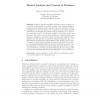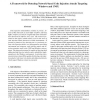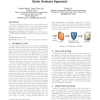84 search results - page 8 / 17 » Zero-Knowledge and Code Obfuscation |
139
click to vote
RAID
2010
Springer
15 years 24 days ago
2010
Springer
Abstract. Malware attacks necessitate extensive forensic analysis efforts that are manual-labor intensive because of the analysis-resistance techniques that malware authors employ....
103
click to vote
TRUST
2010
Springer
15 years 7 months ago
2010
Springer
All practical software hardening schemes, as well as practical encryption schemes, e.g., AES, were not proven to be secure. One technique to enhance security is robust combiners. A...
116
click to vote
ACSAC
2005
IEEE
15 years 8 months ago
2005
IEEE
Code injection vulnerabilities continue to prevail. Attacks of this kind such as stack buffer overflows and heap buffer overflows account for roughly half of the vulnerabilities...
109
Voted
WWW
2008
ACM
16 years 3 months ago
2008
ACM
We propose STILL, a signature-free remote exploit binary code injection attack blocker to protect web servers and web applications. STILL is robust to almost all anti-signature, a...
KBSE
2007
IEEE
15 years 8 months ago
2007
IEEE
Code theft is a threat for companies that consider code as a core asset. A birthmark can help them to prove code theft by identifying intrinsic properties of a program. Two progra...



